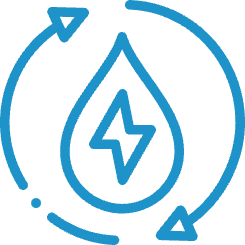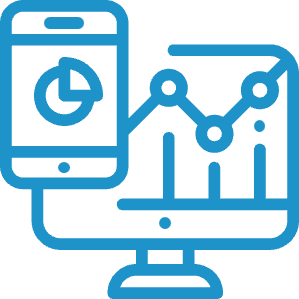Green IT
Developing a greener world
A business request?
You want to join us?
Green IT: for a more responsible and ecological digital world
The ecological transition now concerns all economic sectors, including the digital sector, which contributes 4 to 5% of global greenhouse gas emissions. Faced with the exponential digitalisation of services and the emergence of new technological tools such as IoT and AI, companies are becoming increasingly aware of the environmental impact of their infrastructures. In response to this problem, Green IT proposes a responsible approach to the management of IT resources. For a company, adopting a responsible approach means building a more virtuous digital world right now.
Green IT is therefore a concrete solution for a more responsible and ecological digital environment. By adopting this approach, companies can not only reduce their ecological footprint but also make financial savings. It is therefore crucial that they integrate the Green IT approach into their overall strategy in order to contribute to the energy transition.

Eco-design:
at the root of green IT
Today, greenhouse gas emissions from information systems are due, on the one hand, to the transport and storage of data, the creation and maintenance of network infrastructures and, on the other hand, to the manufacture of IT equipment such as computers, smartphones, tablets or any connected object.
It all comes down to application development. This will have an impact on resource requirements, whether natural or digital, the manufacture, use and lifespan of the application, as well as all the waste associated with its operation.
At ALTEN, we are tackling the root of the problem: we are focusing our offer on eco-design, which aims to integrate digital sobriety into all of our projects and solutions. We have been committed to CSR for over 10 years and we support our customers in their ecological transition.
Our strategy is based on 3 key pillars: understanding, controlling and reducing the environmental footprint of our own IT services, building an ecosystem of innovative players around Green IT and reducing the ecological impact of digital technology, and supporting our customers in their drive towards digital sobriety through a DevGreenOps approach and a framework of tools for measuring the energy performance of their applications and eco-design.
As a responsible company, we were awarded the “Coup de Cœur” prize by the Institut du Numérique Responsable in 2021. At ALTEN, we believe that eco-design is the key to reducing the environmental footprint of digital technology and building a sustainable IT world.
Knowing – Measuring – Improving

Our expertise
Maturity assessment of your digital services
Objectives
To understand the ecological impact of your company’s infrastructure
Basing its approach on AFNOR Spec 2201 best practices for the eco-design of digital services, ALTEN conducts a meticulous review of your IT resources and analyses their consumption, from their design, use and hosting through to their decommissioning.
This audit assesses the maturity and environmental impact of your applications throughout their life cycle, based on more than 137 defined criteria:
- Gathering, questioning and sizing needs and uses as accurately as possible
- Setting an environmental budget
- Looking at how digital services create value
- Identifying the minimum solutions and technologies required to meet the need
- Documenting the eco-design approach
- Supervising, steering and correcting the digital service ecosystem with a view to maintaining its efficiency
- Preparing and planning for the end of life of the digital service and deciding on the future of the data, components and equipment released
These criteria can then be used to assign an eco-score to your applications, identify areas for improvement and optimise code quality accordingly, in order to build a sustainable methodology for all your future developments.

Eco-design of your digital services
Objectives
To design more sustainable applications within your company
The GreenDevOps methodology involves measuring, monitoring and continuously improving the environmental efficiency of your digital services. Inspired by the DevOps approach, it enables you to re-evaluate the ecological impact of your applications throughout their life cycle, so that you can take corrective action in the medium and long term.
Thanks to our eco-design framework, we are now able to integrate eco-design and digital sobriety into all phases of application development.
- Planning:
- Raising awareness and training in eco-design
- Definition of an environmental budget
- Deployment:
- Evaluation of compliance with the environmental budget
- Development:
- Application of eco-design best practices
- Green Coding
- Use:
- Implementation of energy efficiency
- Automation of the adaptability of resources to use
- Construction:
- Static analysis (CAST)
- Supervision:
- Measures the environmental impact of the infrastructure (Azure Carbon, FootPrint, Scaphandre, EasyVirt)
- Test:
- Dynamic analysis (Greenspector)
Reference
Eco-design
The “PERFECTO 2022 EcoIoT4.0” project proposes the implementation of a measurement and eco-design tool for a global solution (hardware and software) and its experimentation for the eco-design of an intelligent sensor, in order to carry out predictive maintenance operations on cutting tools in a factory 4.0. Optimising the processes, avoiding breakdowns, making gains on the wear and tear of these tools as well as on energy consumption are the main objectives targeted by ALTEN, SIEMENS DI CS and GREENSPECTOR, with a concrete application in the factories of a leading partner in the aeronautical industry.

Tracking the consumption of your digital services
Objectives
To measure and control the energy consumption of your company’s applications
The advent of the Cloud and the transformation of applications into microservices means that IT resources and available computing and storage capacity can now be used more effectively. However, the proliferation of microservices can also make your infrastructure more complex, increasing the amount of data exchanged between services and the distance covered by each request and response, resulting in higher energy consumption.
ALTEN therefore provides you with a range of in-house or partner technology solutions, as well as monitoring and automation tools to measure your carbon footprint continuously and alert you to any potential regression.

Green IT training
Objectives
To professionalise eco-design
ALTEN has now chosen to train its Infra-Cloud developers and engineers on the impact of application development and good eco-design practices. In doing so, the Group gives responsibility to the consultants who will then work on your information systems.
To date, more than 1,000 employees have been trained and certified. In turn, they can provide your teams with training in eco-design and Green IT. ALTEN also raises its customers’ awareness of all these issues so that Green IT becomes everyone’s business.
Reference
Round table: challenges of Green IT
In order to professionalise eco-design, ALTEN organised a round table with Mounir Mahjoubi, former Secretary of State for the Digital Economy and co-founder of Eversy, Patrick Fulop Vice-President of Cloud Operations in Thalès DIS (Digital Identity & Security) and Jacques Moulin, CEO of Digiworld Institute, to discuss the challenges of Green IT in business. During this exchange, ALTEN’s customers were able to learn more about Green IT: “The impact is not just what we do wrong, it’s not just our carbon footprint, it’s also everything we do right”. Mounir Mahjoubi.


benefits of the offer








